#Metanarrative
Text


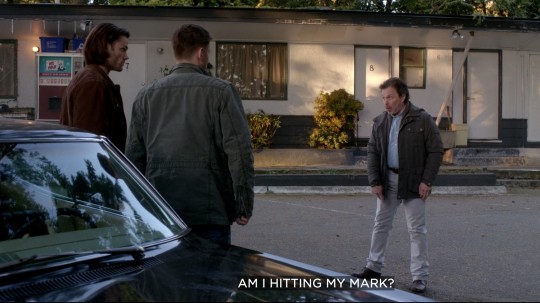
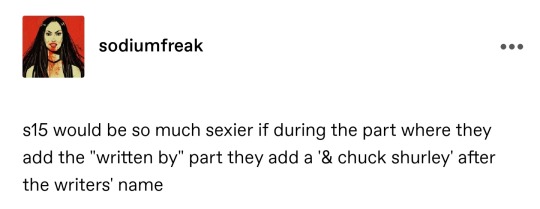


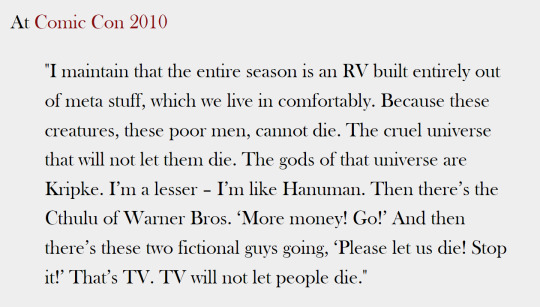

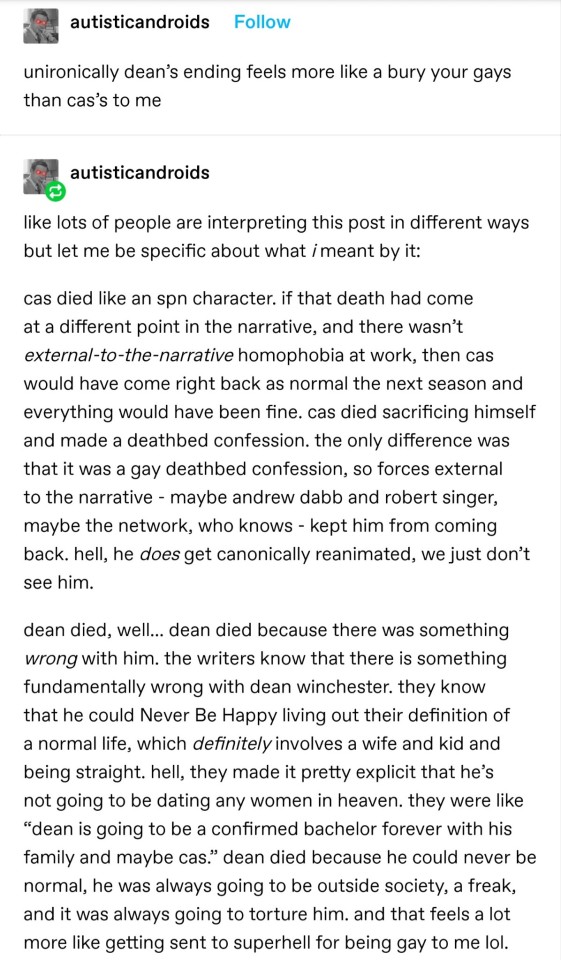
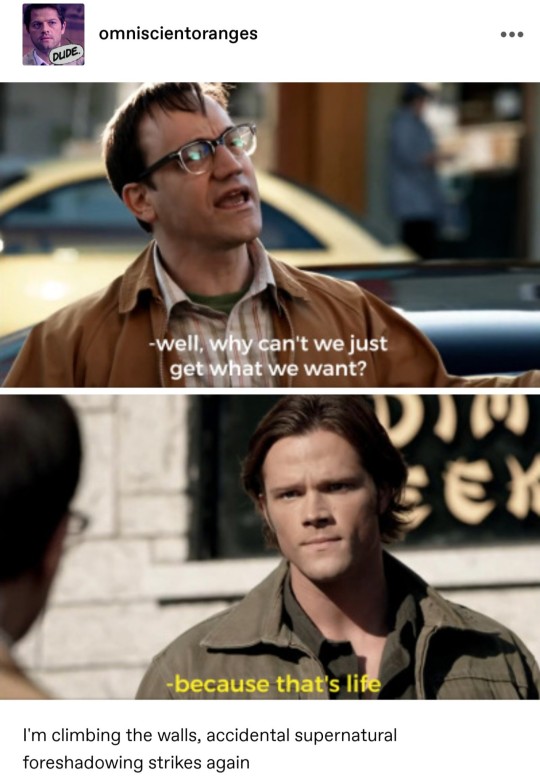
Credit to: @sodiumfreak @breha @stepdaddean @sundryvillains @autisticandroids @omniscientoranges
Metanatural part eight of ?
#supernatural#spn#destiel#deancas#casdean#dean winchester#castiel#sam winchester#supernatural meta#metanarrative#metanatural#mine#web weaving#spn meta
15K notes
·
View notes
Note
Ehehe, I see that Josuke Araki has made his way into your script :P
Are there any other JoJo's floating around in Soul Society and beyond?
So I like to populate the background characters of my fic with characters from another series as just a fun reference, but I feel like some people are reading into it a little to much. It's like- well, there's a watsonian perspective on it and a doylist one and a sort of meta-watsonian one.
From the watsonian/in-narrative perspective? You know that line from that Stucky fic everyone loves about "we deserve a soft epilogue?" I like to imagine AUs for main characters where they still live in an animeverse, but are free from the burden of being The Main Character. Usuke Urameshi lives in Karakura town, but he was never The Spirit Detective. He's just some former punk with mild psychic abilities who runs the ramen shop Ichigo goes to sometimes. Josuke is just some guy that has enough power to be a shinigami, but he's just like, rank and file. You see him in crowd shots. They're alternate universe versions of their full powered, main character selves and probably happier than those versions.
From a doylist perspective, it's a fun game of reference tag to play with the reader. A sort of where's Waldo of random characters from related series. Sort of like putting Samuel L Jackson in a bit part in your movie and giving him a purple prop to fiddle with. He's not playing Mace Windu, but for sharp-eyed nerds, he is making a star wars reference. Sometimes it's just for fun, sometimes is a way to lay on some really subtle thematic context. Like overlaying a 8% opacity layer of yellow on a digital piece to give the impression of late afternoon. Nothing explicit. Nothing relevant to the plot. Just a bit of seasoning.
From a meta-watsonian perspective, a lot of how I write fic was influenced by the old Kids WB bumps where the voice actors would play their characters *as though they were actors hanging out on the warner studios lot* Batman was still Batman, but he was also a guy playing Batman on TV. Yugi moto still had the cosmic powers of the millennium puzzle but also complained about how much time he had to spend in hair and makeup. So when you see a character from another series in my fic, they're an alternate universe version of themselves that is Not Relevant To The Plot, and on another level they're like an actor famous on another show, coming in to do a bit part on their friend's show for funsies.
...but mostly I do it so I don't have to make up names for OCs I'm only using for four seconds.
To actually answer your question: Yuzu is a HUGE fan of this educational YouTube channel run by Marine Biologist Jotaro Kujo. He's the only guy who gives echinoderms their due. She shows Ukitake and Unohana and they like him a lot too. Unohana writes to him to put him in touch with Hanataro and the two put together a major survey of venomous marine life with potential medical applications. Ukitake just likes fish :).
#AEIWAM#An Elephant Is Warm And Mushy#bleach#bleach fanfic#metanarrative#the thing to remember is that i don't do intergated crossovers#but sometimes friends will do a bit on thier friend's show
143 notes
·
View notes
Text

a revelation that can easily fly under one's nose is that Jade's Grandpa's expedition to the Medium actually happened contemporaneously with the events of Homestuck's first four acts; Jake's mysterious appearance on the Land of Wind and Shade is the very same expedition on which he took one of Typheus' minions as a trophy.
so when Jade observes that her Grandpa got his fourth wall "years ago", what that actually means is that he'll pilfer it from a bureaucrat's office sometime today; and if we're lucky, we might even be able to spot the moment he gets his hands on it.
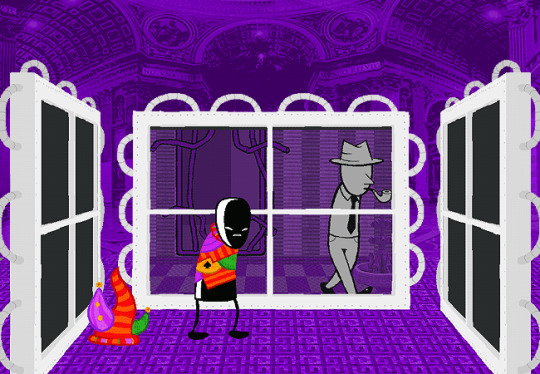
and as it happens, at the actual scene of the crime, the given time frame is a much cagier "some time ago." so when was it? when did Jake get the opportunity to pop over to Derse and take the fourth wall, so to speak?

the answer is literally two pages earlier when Andrew Hussie makes his first appearance as a character in his own webcomic. the fourth wall is stolen from Noir's office between panels, at the exact moment the fourth wall officially disappears from Homestuck the comic.
707 notes
·
View notes
Text
Babe wake up, new theory about the metaplot and The One Who Waits just dropped and I'm being so normal about it

If RTD retcons Donna and TenFourteen's platonically-happily ever after, I am going to write a very strongly worded letter
Alt text below the jump!
Alt Text begin: reddit user Bob of the old ways says "I think it ties into this season's metaplot about The Pantheon. The One Who Waits has trapped The Doctor in an artificial reality and is using him to tell stories for the Pantheon's amusement, something like a cosmic Truman Show. The Doctor and Ruby are going to slowly figure out that they're being used as entertainment, and that Ruby is not "real" she's just a character made up for this cosmic shadow play. The Doctor will find a way to escape and make Ruby real in the end. Just my bonkers idea." End of alt text.
#i definitely did not squeal OOOOOOOHHHHHHH at my empty house just now#doctor who fan theory#doctor who season 1#doctor who season 14#doctor who series 14#reddit comments#reposted from reddit#the one who waits#doctor who spoilers#fifteenth doctor#ruby sunday#ncuti gatwa#millie gibson#metaplot#metanarrative#fourth wall what fourth wall
51 notes
·
View notes
Text
thinking about how the metanarrative of Christianity sweeps up all the little good stories within itself and makes them true…
in this world all is not well. so often love is proved untrue and the evil prey on the innocent and beauty is not goodness and heroes are unworthy. but God refuses always to let the true stories ring hollow.
like…we say “go to sleep, it’ll all be better in the morning” and in fairy tales it often is. a dream in the night, or a sudden change in fortune, or a curse’s end occurs and along comes the happily ever after. but here in this world? so often you wake up and it’s worse. yet that story - it will be better in the morning - is not untrue, even if it seems too simple. it will be better when we wake from the sleep of death to heaven’s endless morning. it will be better in the morning when Jesus returns to make all things right, even here.
there’s so many more, of course. the prince rescues his bride from the dragon. adventurers find the spring of eternal life. a hero descends to the underworld and returns alive. a man loves his friends enough to die for them. God’s story makes the stories true.
#you know this friends#you know#but I am always thinking about it nonetheless#add your favorites :)#fairy tales#metanarrative#christianity#symbolism
218 notes
·
View notes
Text
Intertextuality and Television Discourse: The Max Headroom Story.

Max Headroom, the computer-generated media personality, presents a good opportunity for an investigation of the degree of intertextuality in television. Max combines narrative genres (science fiction and film noir), television program types (prime-time episodic narrative, made-for-TV movie, talkshows), advertising and programming, and electronic and print media. Analysis of one channel of discourse, commercials and advertising, shows that neither advertisers nor textual theorists can rest safely on their assumptions. The text involved here is complex in the very sense that culture itself is complex, and readings of media that reduce complexity to a simplistic ideological positioning of readers are reductive and based on an overprivileging of dominance over the intelligence of viewers, and their power to expose and exploit contradictory textual elements. By over-emphasizing the hegemonic and deemphasizing the emancipatory or oppositional, injustice is done to both the complexity of texts, and their potential for encouraging critical positionings among readers. Only through empirical investigation of individuals' readings in a consistent and systematic fashion will it be possible to determine the relationships between viewers and texts. 1989
https://archive.org/details/ERIC_ED310462/page/n1/mode/2up
42 notes
·
View notes
Text
Undertale As Staged Production
I've been writing a very large essay discussing the role of loneliness & tragedy in Undertale. As a necessity, I've been going over a lot of dialogue and I've stumbled across some that isn't too obscure but I have a conclusion that I haven't seen before, and that is all of Undertale is staged by the characters for your benefit. Every NPC is aware that this is a game and they are staging the story of Undertale for you to go through.
A lot of the information I'm going to discuss can be taken as one-off gags from Toby that have no implications whatsoever; and sure, I'm not stating this as objective information, I'm posting this because I think it is an interesting reading of the game. Do with this information whatever you will.
Let's begin with Toriel, specifically the Toriel we find while entering hardmode—an alternate mode of the game that can be entered by naming your character "Frisk", it features harder enemies, alternate items, different dialogue and ends after you beat Toriel. Most of hardmode is inconsequential for this reading, except for the dialogue you get between Toriel and the Annoying Dog—a stand-in for Toby—at the end of Toriel's fight. Toriel's dialogue goes as it would in a regular run of Undertale, but when the final line is said and the game transitions out of battle mode, the Annoying Dog appears and says. "And that's the end of Hard Mode!" Toriel then says, "Eh? You are ending it NOW? And on such a dramatic moment...?" Annoying Dog follows up with, "And that's the difficult part. Not the bullets. But accepting that it's all over." This scene shows that Toriel is aware of the Annoying Dog, she is aware that it has power over this world and the ability to "End it [the run/game]" and she is completely fine with this. Moreover, she is going along with it. Her dialogue about it being "such a dramatic moment" implies that she is aware of the moment outside of herself and is playing a part to fulfil that drama. Furthermore: all of the tension and emotions of the scene stop the second the Annoying Dog comes out. If Toriel is able to stop her heartfelt emotions on the spot then that implies, but it isn't a certain thing, that these emotions weren't real to begin with and that she was acting them out.
There are some more insignificant lines here, but I would like to draw our attention to the Annoying Dog saying to Toriel, "Hey! Aren't you supposed to be dying or something?" And then Toriel, acknowledging that the run, or "production" is over, says, "Well. What is the point of that now?" This dialogue portrays that Toriel was playing a role and that dying was a part of that role and was staged. But with the production over, her continued acting is no longer necessary. And that's the end of the scene and of hardmode as far as we're concerned. You can argue that this is non-canon or whatever but that's not the point of this reading. This scene illustrates that Toriel is aware that this is a production where roles are expected of her and that she is happy to fulfil those roles.
This is not the most consequential thing to this reading, the "meat" if you will come with my discussion of pink names. But before we get there I would like to discuss an obscure Alphys line. This line is obscure, and interesting, because it does not appear in the game at all but only within the code. The line in question is within the data for Mettaton's quiz and specifically, the question, "Who does Dr. Alphys have a crush on?" and within the code of where the answer would be, instead there is this dialogue, "LOOLLLL If you came to this part of the code to see who I have a crush on you're out of luck [Dialogue decapitalized for readability]." And this dialogue plainly shows that Alphys is completely aware of the game's code, and is even able to interact with it. Much like an actor would be aware and able to interact with the backstage of a production. But this is only an implication, which is why I don't think it's too important
Now, the pink names. This is an obscure mechanic in normal Undertale where if you talk to a particular Froggit in the Ruins while having spared 6 or more monsters, he will say, "Surely you know by now a monster wears a Yellow name when you can spare it." And after this line you are given a choice to say it's, "very helpful," or "It's bad." If you select "it's bad" then the Froggit will say, "Really? then I'll tell all of my friends to tell their friends' friends... never use yellow names. How about that?" And from there you are given a choice to keep yellow names or to throw them out. And if you say not to use yellow names, then they don't, they're gone. If you encounter another monster and then go back to the Froggit, they will say "How are you doing without yellow names?" and you are given the choice to ask to bring them back. If you do ask this, the Froggit will say, "Huh? It's rather inconvenient that you changed your mind like this. Since I told everyone not to use yellow names, everyone threw theirs out. Well, last year it was fashionable to have pink names. [...] I'll ask everyone to [bring their pink names back]. But this is the last time!" This dialogue is so significant to this reading because it states that the yellow names are not a game mechanic designed for you to know when an enemy is spareable, but something that the monsters are doing for you. And they are doing this to make the game, or the production, easier for you to get through. This implies, though does not directly state, that every monster—as every monster will now have a pink name— is aware of the sparing mechanic and is trying to guide the player to spare them more easily. Thus, they are staging the game for you to go through, acting out certain parts such as sparing and mercy and there is an implied knowledge in this that they know this is intended to be a game where you can save everyone.
So that is the reading for now, perhaps as I write my much bigger essay more I'll come across more interesting things. I would like to add though that this reading does tidy up some things, such as Asgore knowing how many times he's killed you. If Asgore is already that this is a game/production and is just acting out his part than him knowing how many times he's killed you makes sense without any reaches or contradictions.
#Undertale#Undertale theory#Undertale alternate reading#theatre#metanarrative#undertale meta#Undertale metanarrative
38 notes
·
View notes
Text
instagram
🇺🇸

#Instagram#potus#your president#patriot#Americon#military industrial complex#DEMOCRACY#���Ɣ#dogs fmm#elder writer#metanarrative
2 notes
·
View notes
Text
I know that, in many situations, this is an outright stupid take, but I just straight up don't consider "word of god" to be canon. Not real 'til it's in the story. "Oh, this is the exact thing that was going on here" is absolutely essential to really good critical analysis, because it lets you compare and contrast overt authorial intent with your own and others' interpretations of the text, but as far as "canon" goes, it's just a little silly. Event X wasn't in the story, so it didn't happen. The fact that the author says it happened means less for the narrative than it does for the metanarrative.
And yeah, there are a lot of counterexamples. Reader says "Hey, you put 3 here and 5 here. Does this mean 8?" Author says "Actually, no, I put 3 here, 5 there, and -4 there, so it actually means 4." Sure, that's close enough to canon. The numbers were all there, but Reader missed one. No problem. But my problem lies in the fact that people say "because the author said it, it's canon". I would prefer the interpretation that "because the evidence is in the story (as helpfully identified by the author), it's canon."
That's wholly different from the (imo) all-too-common "Since 3 is here and 5 is there, does that mean 8?" -> "3 and 5 are there, but also ABC XYZ 123 is going on behind the scenes where you didn't see it, so it's actually 54." This is a great way to build a world, but it's not a great way to deliver one, in my opinion. If ABC XYZ 123 are all happening completely off-screen, an author giving metanarrative credence to them doesn't make them any more "canon" than the thorough speculations of a reader. When more than a loose consequence of ABC is seen on-screen or on-page, yeah, we can say it's like the example above, where it's just the author helpfully pointing out the existence of other evidence or factors. When ABC, XYZ, and 123 exist exclusively off-screen or off-page, I feel like the word "canon" just doesn't apply.
And of course there are nuances to this. Stories hold a finite amount of content, and the world holds a functionally infinite amount of information. Authors should not, at large, be expected to account for the intricacies of every detail. Some find it fun, some find it necessary, some believe their art is lesser for that detail's absence. My point is that arguing over what's "canon" is very fun, but bringing the author's word (unsubstantiated by text) into it is a little silly.
This isn't about any author in particular, just the fanbase tendency to want "more, more, more" and push authors to exposit things outside the scope of their story.
7 notes
·
View notes
Text
Men writing women writing men writing women writing men
---
He smirked at her, deviously, and her heart skipped a beat.
"You think you're so charming" she said, raising an eyebrow sassily but putting poison in her words, "but you're wrong".
He frowned for an instant but then smiled more broadly, his perfect teeth showing just a little bit.
"Then why are you so charmed by me?", he said, a dangerous glint in his eyes.
'You bastard, how dare you!', she thought, and hated the blushing she could feel spreading through her cheeks. She wasn't about to let this, this handsome devil take all control away from her!
She stood up and resisted the urge to throw the glass of wine on his face. 'Be dignified' Julie thought to herself, and then just gave him her best dismissive look and turned around to leave.
That was when he grabbed her wrist. His powerful hand warm on her skin, holding her so gently, and yet so powerfully, like fur covered handcuffs.
She looked down at his hand, his bare forearm, the muscles dancing under his skin as he deftly controlled his own strength.
---
Emily sat back from her laptop, her eyes glued to the words on the screen, her heavy breathing moving her generous breasts up and down, up and down. Before she could control herself, her hands began to caress her own boobs. She needed to keep writing, but her sensitive breasts were now demanding all her attention. Soon she was openly fondling her gorgeous boobs, they were beautiful and she knew it, and also so sensitive, and she never wore a bra.
A sigh leaving her sensuous lips, Emily managed to go back to writing, but she didn't bother rearranging her crop top, letting her boobs peek out.
---
"Please", he said, "stay". Then he smiled again that wicked smile which, by now, Julie was beginning to consider her own undoing. "I promise to be good", he added, but somehow that 'good' had sounded so very bad.
Julie hesitated. What was she going to do anyway? He had brought her to Paris, for God's sake! A tremor ran up and down her stomach as she reminded herself of the danger inherent in this situation. She had come to Paris with this man. But truth be told, she would have gone with him to a McDonalds… or to Hell. But she wasn't about to let him know the effect he had on her.
"Get your hand off of me", she said, loading as much disdain as she could summon into her words.
He let her wrist go, staring deeply into her eyes, and without breaking eye contact -god damn those steely blue eyes-, he took his phone. Deftly, not glancing even once at the device, he dialed a quick contact.
"Sir", answered a voice on the phone.
"John, drive the lady to the airport, tell Mark to fly her home. She will not have any issues at customs". He said to the person on the other side of the line, and hung up. The last part had been a simple statement of fact. No, a simple statement of power.
He sat back and kept looking at Julie, it was her move now. Where did he get all that damn confidence? How did he know that Julie was going to hesitate for so long, knowing she should leave, knowing she would stay?
Julie cursed him and his steely blue eyes, and his confidence and his, his power, but then she sat back down.
---
Emily was trembling now, her boobs shaking deliciously as she did. Her scrumptious toes wiggling and rubbing against the carpet, her long bare legs rubbing against each other. She was wearing what she always wore when she was writing, tiny shorts, with no panties, and a tiny, tight crop top, with no bra. She moved her round hips, rubbing her bubble butt against her chair. She already knew where the story was going, but she didn't know if she could take it there before having to…
Emily took the glass of wine she had been drinking while she wrote, but instead of taking a sip she poured it all over her crop top to cool herself off. Her nipples, already hard, hardened more. Then she lifted her long, sculptural legs and placed her dainty feet on her desk, admiring her own skin illuminated by the laptop's screen. She ran her hands up and down her thighs and her calves. It was amazing how she had these gorgeous legs, and she didn't even have to exercise! Really she could be a model, or a porn star, but she was too nerdy and brainy for that. She took off her glasses, which she barely needed, and sexily put the tip of the arm between her sensuous lips.
---
The sound of the vintage typewriter stopped and Stephan stood up, flexing his neck and his shoulders, then cracking his long, nimble fingers.
"You know you shouldn't do that", I told him.
He looked at me and smiled shyly, then he pulled the sheet of paper from the typewriter I'd gotten him at that yard sale, and offered it to me.
"Tell me what you think, you know I really value your input", he said. I got lost for a moment in his eyes, slightly puffy and adorable, and his rebellious hair, which always seemed to get wilder when he wrote.
I took the paper.
"So, what are you trying to achieve here?" I asked as I began to read.
"Well, I'm trying to create a deconstruction of gender normative erotica, highlighting its problematic aspects".
I nodded, putting on my most serious expression, while inside me, my heart melted. It was so adorable when he tried his best at being an ally, yet there was that uncertainty in his voice, born out of his inner acknowledgement of his limitations as a cis straight man.
I finished reading and looked at him, as he tried to hide his eagerness to listen to my feedback.
"I like what you've done with the male gaze in the voice of the unnamed narrator describing Emily. But I'm not sure about Emily's own voice. Aren't you worried that in your haste to articulate a toxic narrative, you may be replicating a different one?"
His eyes widened.
"You think I could be doing that?" he asked, and his gaze shifted slightly past me, as he looked inward, taking in my comment in its entirety.
"I think it's good to consider the possibility" I said, enjoying contemplating the outward manifestations of his inner workings.
He shook his head in acceptance and smiled his silly lopsided smile.
"You may be right," he said, chuckling apologetically.
I smiled too and got up from the bed, walked up to him and sat on his lap, ruffling his wild brown locks which had begun showing strands of gray, just enough to be interesting.
"I love that you try so hard", I told him, feeling happy and content as he wrapped his arms around me.
"I love that you always guide me," he said, resting his cheek on my arm.
---
Ana put down her cell phone and took a deep yearning breath. Lately she had been writing too much about Stephan. 'Am I getting obsessed with my own OC?' she thought. 'Why can't there be men like that in real life?'.
She stared at the roof, lost in her thoughts of the perfect man in constant self deconstruction. Then she began to play with her boobs which were awesome boobs that boobed very boobily.
7 notes
·
View notes
Text
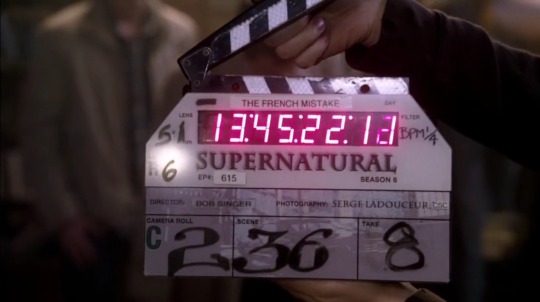

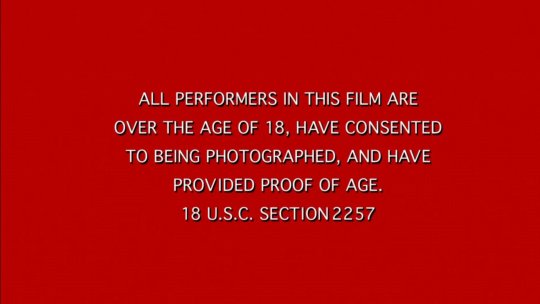
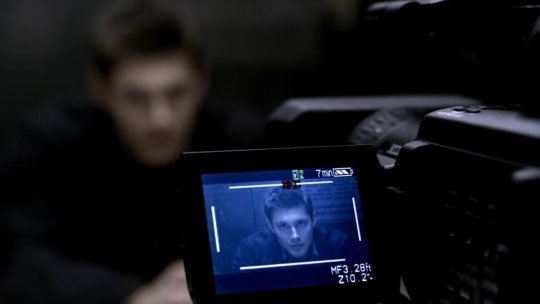
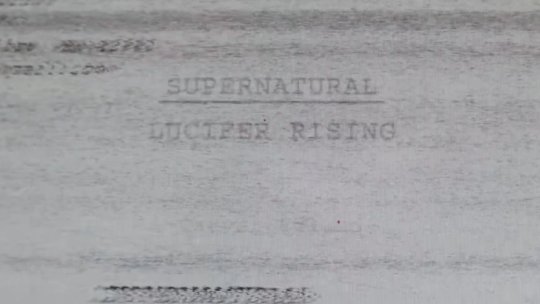
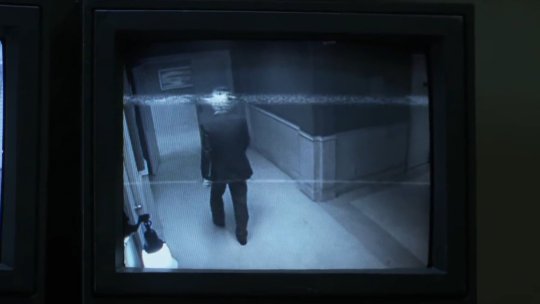
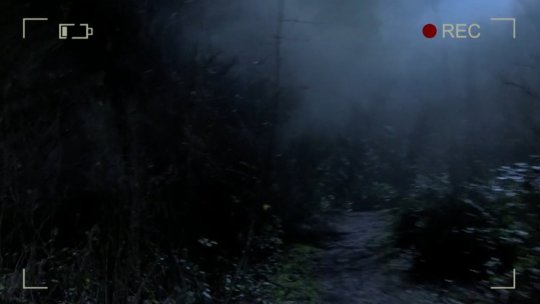
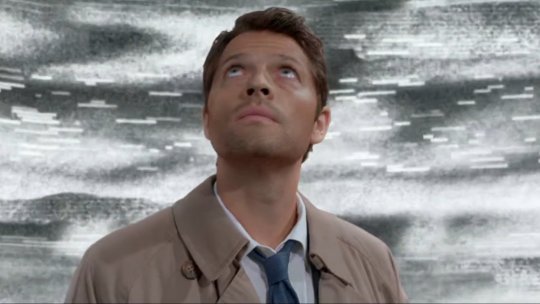
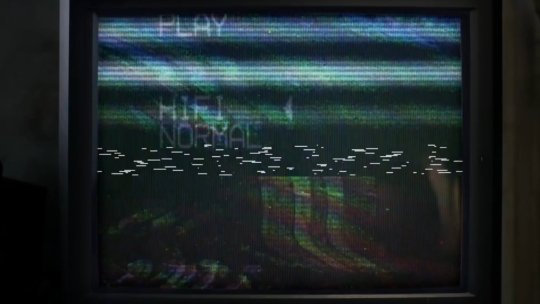
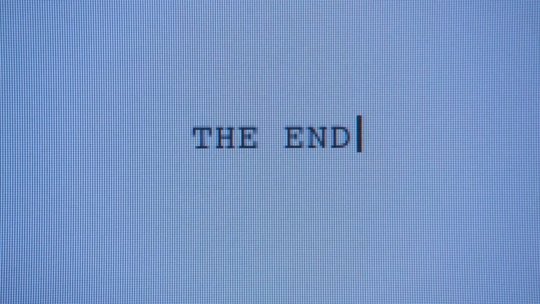
SUPERNATURAL 2005 - 2020. (More)
#supernatural#spn#dean winchester#destiel#deancas#casdean#castiel#supernatural meta#metanarrative#spn meta#metanatural#spn themes#spn motifs#supernatural parallels#supernatural motifs#spn parallels#spn screenshots#spn screencaps#supernatural screenshots#supernatural screencaps#screencaps
758 notes
·
View notes
Text
Post-postmodernism?
Idk.
#dougie rambles#personal stuff#no context#what#postmodernism#metanarrative#philosophy#modernism#post postmodernism#shitpost#or is it#idk#maybe#probably
3 notes
·
View notes
Text
Homestuck's Gnosticism: The World / The Wheel
Everyone knows Homestuck is "a Gnostic story".
Wait, why does it feel like we've had this exact conversation before...?
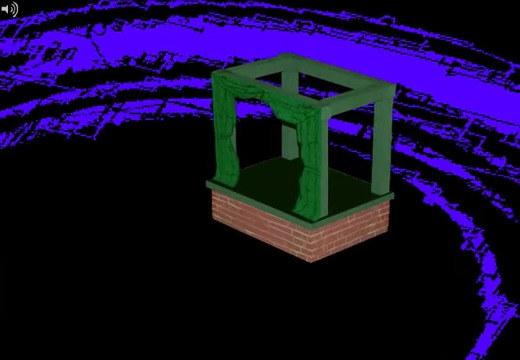
AH. SO NICE OF YOU TO JOIN ME.
If you followed along with the first post in this series, you'll be familiar already with the Gnostic nature of Homestuck's central conflict between the spirit world and the flesh. And even if I say so myself, I think that post is pretty definitive; if you're ever unsure what a particular character's motivations or end goal are, the Conflict will tell you. But what's conspicuously absent from the post is any explanation of what actually happens in Homestuck. We've covered the why, but very little of the how.
I left us off on the "synonymous goals" that spring naturally from this conflict between flesh and spirit; attaining ultimate knowledge, and escaping the confines of Homestuck itself. Eagle-eyed readers probably spotted what was lying between the lines, there: the comic is called Homestuck because it's about being stuck in a house, so the ending is about escaping the house. But what does that really look like? And how did they get in that house in the first place?
Let's return very briefly to a quote I used in the previous post. "[Y]our ultimate self [...] unlike god tiers or bubble ghosts or whatever, it really IS immortal". Two assumptions naturally grow out of this fact. First, and probably most obvious: when John dies, he's not really gone. The idea of him still exists out there, somewhere, and in our minds, so he still exists. Second, though: if the idea of him is eternal, John obviously didn't start existing when he was born. So again we ask, where did he come from?
How did John get here? Where does he go? The answers to these questions are like the four sides of one hypercoin, in that Homestuck is a time loop... of a sort.
To begin to understand this, we need to reiterate what was basically "the point" of the first post: Homestuck operates on two distinct levels, a spiritual plane consisting purely of ideas, and a "literal" physical dimension. What happens on these two planes often mirrors each other, and because Homestuck itself is a work of fiction which operates in the realm of ideas, they can even intersect. But ultimately, what "literally" happens to the characters in Homestuck is not the same as the ideas the comic is expressing in its spiritual metanarrative.
The fact that a physical time loop is impossible is something Homestuck inherits from real-life physics: to put it simply, John being born can't be the physical John from the end of his timeline, because that John would be way too old to be a baby! But ideological time loops are not only something sanctioned by Paradox Space, but essential to its very being; they are where it gets its name, after all! To repeat another lynchpin quote from the comic: there is essentially nothing new in paradox space. Any idea that seems new necessarily must have just come from somewhere else.
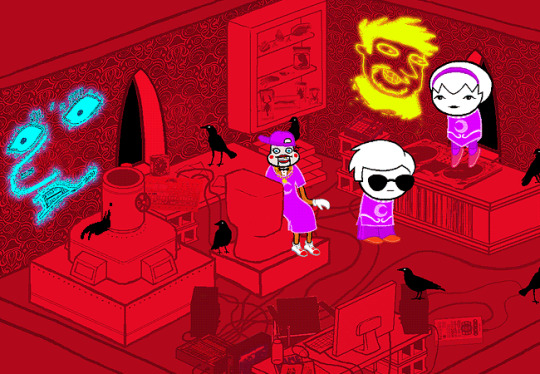
"SbaHJ has the distinction of being the symbolic language of [Dave's] subconscious." (Homestuck: Book 3: Act 4, p. 282)
Frequently we see this expressed in the rooms representing characters' dreams, which, as discussed, sort of transcend the character's physical form and represent the broad ideas that characters are made of. Dave's dreams (pictured above) are covered with drawings of Sweet Bro and Hella Jeff, characters he seemingly invented as a child after being inspired by a drawing Terezi sent to him. But Terezi's drawing was based on Dave's own illustrations she saw later on in his timeline; so which of them truly "invented" Sweet Bro and Hella Jeff? Neither of them did; SBaHJ exists as pure subconscious ideological matter floating through Paradox Space, only sometimes being picked up by a character's conscious mind. Similarly, Gamzee tries to manipulate this subconscious realm when he uses his psychic powers to place a terrifying effigy of Jack Noir in John's dreams, as punishment for the destruction of the trolls' session. But as we know, Jack Noir only took that form because of the nightmares this doll caused! So again; neither John or Gamzee thought up the demonic clown "first". It existed in the realm of ideas before either of them ever had the chance to invent it.
These kinds of ideological loops are the bread-and-butter of jujus. We're told their origins are untraceable and that they can't be destroyed, but neither of these things is really true; these superstitions exist only to obfuscate the true rule that jujus "emerge spontaneoUsly from the void." Rather than be erased from existence, a juju can only be banished to that same void of nonexistence where disembodied ideas live, and then pulled back into the world of dreams by a prospective psychic.
With these rules established, now we can really delve into with appreciation the ideological time loop that underpins all of Homestuck. And like all good time loops, the best place to start is at the end.

ACT 7 (Are you tired of seeing it yet?)
Let's not insult anyone's intelligences here: you know and I know that Caliborn's little house juju looks like the Homestuck logo because it is Homestuck; when he wins it from Yaldabaoth, he takes control of it, and when he sucks the heroes inside, he's trapping them in the confines of his material world.
What's essential to keep in mind here, though, is that the power of a juju is the power of the idea itself. It's easiest for us to think of the word juju in Homestuck as a concrete noun, referring simply to a magical object. But the word's real-life origins, referring more abstractly to magic or enchantment, are still relevant in this fictional framework. Lil Cal isn't just "a juju", but is "FILLED WITH BAD JUJU." Magic in Homestuck has always really been about the idea that believing in something can make it real, and the purpose of all Homestuck's dealings with chucklevoodoos and jujus is to evoke the anthropological concept of the "fetish"; an item whose power comes from human beings ascribing supernatural qualities to it. Jujus are all part of the "game" the cherubs play, with all its rules and quirks; breaking an enchantment is like breaking a rule, in that it changes nothing about the real world: you've just infringed upon an idea. The juju isn't the object; the juju is the power, good or bad, ascribed to the object.
All of this is really just to say one thing: Caliborn's home juju can't trap the flesh versions of John and his friends; as we established, you can't send old John back in time to become young John. But what a juju can trap is something far more important; the ideas of John and his friends. This is why it doesn't matter if the heroes who travel back to the beginning of everything to beat Lord English while he's still a kid are the "main" timeline versions of those heroes from some point in the future, or if the Epilogues' version of events is truth and they're some "irrelevant" offshoots: because all of those characters are represented by the same idea, and that's what Caliborn puts in the box. No matter what timeline John is from, he's from Homestuck, to Homestuck he must return, and as such Homestuck is what he must be forced to escape. Refer again back to the previous post: Caliborn can't create or destroy, only take pure ideas and alchemise them down into a form he can control.
And that's why Act 7 so enigmatically features two different white home-doors (above), seemingly so interconnected yet effectually unrelated. Because Act 7 takes up the hefty role of concluding two storylines simultaneously: allowing the "real", flesh-world versions of John and his friends to escape Lord English's reality through one door, while also concluding Homestuck's metanarrative by setting the ideas of John and his friends free of their prison through another door.
So far, most of this is probably stuff you'd have either figured out on your own or at least heard from someone else already. And if we set aside such distractions as run-ins with radioactive imps and omnipotent dog-gods, the "whats" and "hows" of the heroes' story are probably the easier parts of Homestuck to figure out. What's more difficult to fully comprehend on a first pass is how Lord English himself fits into all of this.
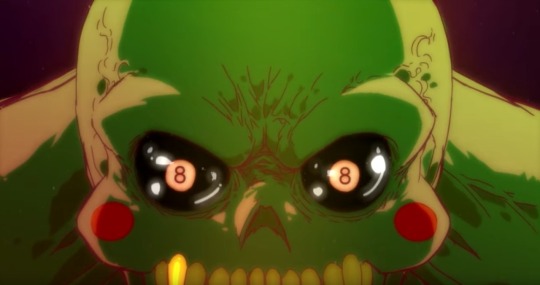
If you've been following me for any stretch of time, you'll notice in my analysis of Homestuck I've returned to the topic of black holes frequently. I've lost track of how many versions I've published of what I call "Black Hole Theory". And I won't link to any of them here, because ultimately Black Hole Theory was a corkboard to which I could pin the evidence that would eventually, piece by piece, lead us to where we are right now:
If the home juju is a white "hole" leading out of the confines of Homestuck as a story, then black holes are the doors that lead back in. An early clue to this comes in the form of Calliope's stage in the heart of a spiral: these spirals are Calliope's visions of black holes, which she uses as "dark pocket[s]" from which "no information can escape" - a literal description of a black hole - and that stage is the very same one Caliborn stages his story on when he takes full control of Homestuck's narrative. The meaning here should be clear: Calliope creates black holes, and it's the center of these black holes where stories can take place.
But for all the evidence we need to suggest that Lord English's fall into a black hole leads to something more complex than just his destruction, we need not look further than conventional science:
In the quantum world [...] information cannot be created nor destroyed.
Lisa Zyga, on the conservation of quantum information.
This rule that "ideas" are truly immortal, and that any time an idea seems to be destroyed it must have merely been transported somewhere else, holds true even in the scientific world of black hole physics. This has been played with in MS Paint Adventures before; theoretical physicist Stephen Hawking's take on black holes was that some stuff could in fact escape a black hole, contrary to Calliope's assertions, in the form of Hawking radiation. But Hussie's own version of the story was always a lot more to the point: something gets sucked into the center of a black hole, it gets shot out somewhere else. In hypothetical physics this is called a white hole - no doubt you can see where this is going.
So Lord English's final moments in Homestuck see him not destroyed, or killed, or defeated in combat in any traditional way, but sucked right back into Homestuck. What exactly does that mean?
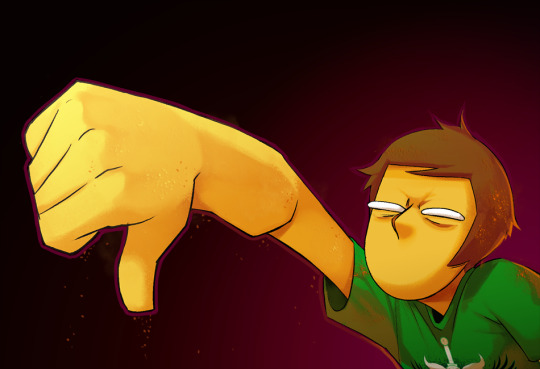
Homestuck, p. 8105
As long as we're talking the power of ideas and symbols, possibly the most blatant a symbol can get is in the form of a gesture; and the thumbs-down is possibly one of the most ancient gestures there is. Dave gets one, Tavros gets one, and, so they say, even the Roman gladiators got them. This precedent makes the meaning of the gesture clear: "you're going down." And it makes sense, too, that Hussie, the "good author", would signal the "evil author's" demise in such a way. But some might question the effectiveness of the power of gesture at such a pivotal point in the comic. Are we really to believe that English's defeat was, even in part, the result of another author merely willing him away like a tyrant doing away with an entertainer who has fallen out of favour? Or did the Hussie-character actually have some kind of plan to deal with his Hulk-like alter ego?
Of course he did.
...now Caliborn has hijacked the property of his experiential continuum which he has reason to believe is called "the narrative". Little does he know you recently made the shrewd decision to purchase(?) the ACT 6 ACT 6 SUPERCARTRIDGE EXPANSION PACK! Just plug it into any in-universe console port to unlock a variety of exciting new gameplay features and proceed through remaining canon unfettered, while Caliborn muddles through six new sub-sub-acts of infantile "subversive parody" targeting the very tale he inhabits, none the wiser!
To allow our heroes the chance escape their narrative prison, English isn't just to be trapped in their old cell; it's to be trapped within an infinitely-recursing cell, not just reliving one story over and over again but forced to live out infinitely many different stories. Not just a narrative loop; a narrative spiral. That's what being sucked into the black hole means for Lord English.
When Roxy - the Hero of Void whose very symbol is that of the black hole - banishes Caliborn-as-Cal into the void, he becomes one of the very wandering ideas with which English plays like dolls. "Instances of [Doc Scratch] have spawned in countless universes", and they have "never once failed to complete [their] objective": whether he wants to or not, Lord English will always be born again. In a new universe, perhaps, maybe even in a different shape, but his role always the same. Caliborn thinks that by filling the supercartridge with special stardust and corrupting the story, he's won, but looking at the bigger picture the truth is clear: he's only playing by somebody else's rules.
Just as Skaia uses lotus "seeds" to store items away for later use, and employs meteors as "Seeds" to send important elements back in time to set up the beginnings of new stories, so too are English's cue ball "seeds" only a means of transporting his essence from one place to the other; the black hole and the Rapture are, after all, only Skaia and the Reckoning sized up to a truly macrocosmic scale. The cue ball is able to be a font of endless knowledge because it is the "white hole" at the other end of the black hole! No information can escape a black hole, and therefore there is no information that escapes Scratch's attention -- he is limited only by his "pockets of void", which exist only to, in time, be filled, as more and more falls into these black holes like a multiversal game of billiards. Not only is this a transparent allusion to one of the most fundamental representations of the paradoxical time loop as a concept, but it is also the ultimate insult to injury: despite having lived an infinite number of lives, and being cursed to live out an infinite number more, Lord English cannot know what his fate will be until he literally falls into it. This is what forces him to lose, over and over again for eternity, while our heroes triumphantly escape Homestuck onto greener pastures.
170 notes
·
View notes
Text
is someone controlling reality like azi controlled the ball?
and who is it? are they doing it deliberately, or unintentionally?
in the ball, we see mrs sandwich's and nina's outfit transformation. there is a sound, but it's not a normal miracle sound, and nina has no sound. i think this could be azi influencing reality rather than a deliberate enchantment azi put there.
he almost certainly is the reason why the road lines keep changing, though that could be put down to his environment picking up sentience like the bentley has. which would still be azi's reality bending. of note, the road lines DO CHANGE in s1. they seem to have the same rules as i think they do in s2.
is he the reason the carpets in the shop keep changing? does he notice?
is he the reason why the extras have weird repetitive outfits--especially tons of yellows which crowley wouldn't put there--and aren't noticing it, or why they're behaving weirdly like they're patrolling the block? much like most of the people in the ball didn't notice until they tried to do something they were prevented from doing, then immediately dropping the issue again? just as we notice people dropping things in s2 or not noticing things?
there's other stuff like the magically appearing coffee sign and moving/changing furniture. people have been attributing this to crowley time traveling, but it could be aziraphale doing it too especially if we're watching several retakes after memory wipes--he's the one most of this is relative to. we could also be seeing separate timelines rather than time travel--timelines crashing together. we did reboot the universe at the end of s1, and god said "Perhaps the recent exertions had had some fallout in the nature of reality". there would now be the reality where armageddon was aborted, and where it was never planned. if there are ripples in reality, they have to go out from the present to the past, and back to the present for all changes to take place. that takes time. like echoes.
in accord with the ball, and the other metanarrative stuff happening, it could be someone else doing it. who can bend reality on this scale? adam. god. jesus, since we know he's already here too. whoever the third baby is, if he has powers. some third party?
that would explain why this stuff didn't happen last season, but is happening now. it would also explain why the weird plaid mountains and cartoon nessie were in the show when this is supposed to be reality-based, notwithstanding miracles and god. semi-real plaid mountains i can excuse, cartoon nessie i cannot. someone is putting that there just like adam manifested the kraken.
4 notes
·
View notes
Text
Tumblr is the place we come to dream, when dreaming means escaping reality and its jagged edges, and we can rework characters that the mind of one created and the ones of many adjusted to whatever need and lack or loss-shaped-hole we carry in our hearts we think, but that is really in our mind, in our eyes, at time in our ears.
There is only so much control we can exert on our lives in this late stage capitalistic era, but when all else has failed I challenge you to find me in the depths my mind has created to give me the consolation I think I deserve and by doing so I become the character I think I need to rescue me, if I can think all their words and all their actions truth is they are me because they come from my mind. And so I become my own saviour and it only becomes hard to grasp between fingers.
But not synapses.
3 notes
·
View notes
Text
Metafuckery in videogames
This is pretty much just copy pasted from my steam review of AI The Somnium Files: Nirvana Initiative. It contains major spoilers for that game, so don't click keep reading if that's something you want to avoid.
tbh i don't know how to deliberately make the post cut off so i'm just adding a buncha line breaks and hoping that's enough
seriously there's spoilers for ai the somnium files nirvana initiative below. and also vague allusions to a twist happening in metal gear solid 2. which i know most people prolly know about cause it's been 22 years but i genuienly didn't know that was gonna happen my first time playing last year cause i never was that deep into metal gear
Okay the real post starts here
It's understandable to not like the story but as someone who loves the sorta mindscrew pulled by Metal Gear Solid 2, this is the only other thing that even gets close, so I loved it for that. More specifically the way it slowly builds up the meta fuckery going on, with small incongruent details slowly becoming more noticeable until the big reveal. I could totally understand not liking this sorta thing, since the story very much has to contrive itself to not reveal this too early on (two mizukis) and the game is very intentionally tricking the player. But I think it's worth it if you enjoy media that in part is about its own status as media, that relishes in its own ability to portray things in deliberately unintuitive ways. And personally I think some (not all [two mizukis]) of the misdirections are really clever. For example, the weirdness of 'the two halves of the same body being found 6 years apart' is mentioned with the first body the player finds, but then is never brought up again for the subsequent bodies despite them being presented in an order that would lead you to assume the same thing is going on. I could totally see that being annoying, "I never said the rest of these bodies were found years apart" "come the fuck on you obviously wanted to believe that" "but I never SAID that was the case outside the first one". Personally I loved that kind of stupidly simple trick, but if someone thinks it's just kinda bullshit that's a totally justified reaction.
I love the small details that lead up to the realization the game's initial description of the timelines is inaccurate; the lack of reaction to Date's supposed 6-year disappearence, the offhand mention of Komeji's bowtie being bought a year ago despite him supposedly having been dead for 6 years. Also there's the whole Frayer ending but it's the slow buildup that sticks with me the most. It reminds me of the slow realization of how similar MGS2's plot/progression is to MGS1's, of initially thinking something might be a minor oversight but eventually concluding that it's too blatant to not be deliberate. (although tbh i still don't think the prototype machine suddenly not needing eye removal is a deliberate part of the story).
Anyways this doesn't really go for the same vibe as MGS2; compared to that, AINI feels more lighthearted about its trickery, with the whole Marble scene where the game comes clean about it. The Frayer ending gets closer to that eeriness MGS2's reveal has, but it also feels less consequential to the overall story, and more like a little bonus thing that gets really meta but only within its own space where the game asks "would it even be that interesting for the 'true' solution to be the neatest happiest one". This sequence as well as the Ryuki hallucination moments also do the other thing I most love about MGS2's fuckery; the feeling that the game is collapsing on itself.
I still think MGS2's meta fuckery has something special and unmatched in anything I know of (emphasis on "I know of"; if you know anything like this feel free to give me recommendations cause i love this sorta thing), but at least now I have one other example of a game that does something similar in a way I enjoyed. Also if you're thinking of Undertale/Deltarune now, I love them too but I don't put them in this category of thing because they're way more upfront about their metanarrative stuff from the start. Also there's the Zero Escape series but that does more to try to justify meta gameplay stuff in-universe (the fields, babyyyyy).This kinda turned into a whole essay but TLDR the story does some unconventional stuff, and it's totally understandable to not enjoy it but personally I really like it.
Footnote: Two of them
Maybe I should write something like this except more focused on MGS2. It's been out for way longer and is way more known so I didn't feel compelled to, since people prolly already analyzed the shit out of it. I guess I love most of its ending except the main conclusion of "behind all the conspiracies, there's some shady group that has 99.99% perfect seamless control over everything and if you blink it's because they planned for you to do that a couple decades ago". While personally I'm more of a "there's no big master plan, people in power try to maintain their power through fucked up means but they're not superhuman, they're capable of fucking up" truther. And it feels like a decent amount of people do respond to MGS2 with "this is literally whats happening in real life the Patriots are just like wokeness". And I don't feel like dealing with that shit. But yea I love metafuckery in games.
#ai the somniun files nirvana initiative#a saucedlx original#thoughts#metal gear solid 2#metanarrative#metafuckery
3 notes
·
View notes